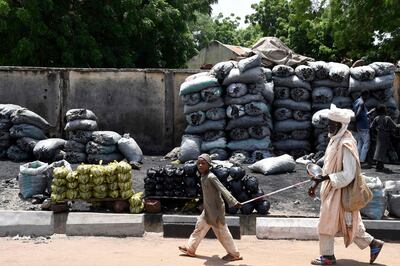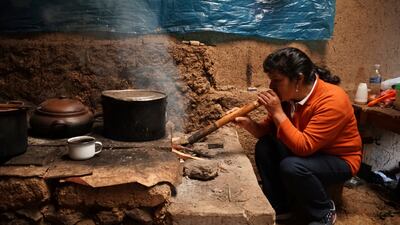For some delegates at Cop26, the summit's focus on coal and cars is overlooking the more homespun issue of the food on our plates.
Lobbyists from Greenpeace to the World Health Organisation have used the summit to call for meat-free diets, which they say are healthier and more sustainable.
But developing countries see another major health risk in the wood and charcoal stoves used by millions of people that cause household air pollution and damage the environment.
Some 900 million Africans lack access to clean cooking and 4 million people a year die prematurely because of illnesses linked to solid fuels, Kenyan Energy Minister Monica Juma said.
“I think it should just not be acceptable that people would meet their deaths this way,” she said on the sidelines of the Glasgow summit, where she called for investment in clean cooking.
“For a long time this was a small pilot project. We need to scale it up. That’s what we need out of Glasgow.”
Ms Juma said upgraded cooking facilities would especially help women and girls, who typically carry much of the domestic burden.
“It’s not about philanthropy. There’s a business case here,” she said. “A mother that takes less time to cook saves time for productivity.
“There’s this perception about this being small scale. 900 million people not having access to clean energy – this is a big market.”
Kenya hopes to expand electric cooking and promote other cleaner fuels such as ethanol, biogas and liquefied petroleum gas (LPG).
The last of these is on the rise as a household fuel in Nepal, said Ram Gopal Kharbuja, a joint secretary in the country’s Energy Ministry.
But Nepal would prefer people to switch to electric stoves, he said, because LPG has to be imported whereas hydroelectric plants can generate power from mountain rivers.
“We are promoting the use of electrical energy for domestic, industrial as well as transport,” he said. The latest climate plan submitted by Nepal to the UN calls for a quarter of residents to use electricity for cooking by 2030.
While these goals aim to improve health and cut greenhouse gas emissions, installing electric stoves in households is not always easy.
Nepal has experimented with miniature electric grids that do not need to be connected to a wider infrastructure. But tariffs on these can be expensive, said Simon Batchelor, a development expert at Loughborough University in the UK.
Collecting revenue is another issue because people who are used to collecting wood for fuel – paying for energy with their labour rather than with cash – are reluctant to hand over money for electricity, he said.
“When you go to communities there are many people who don’t understand these terms,” said Anne Songole of the Access Coalition, a civil society group. “They know food and they know it tastes good.
“As I look at Cop26 today, we are actually talking about coal but we have really neglected cooking, which is an important issue.”
It is not only activists from developing countries who want to talk about food. Many around the world see meat as an unacceptable luxury given the emissions it creates and the availability of plant-based substitutes.
Livestock is one of the major sources of methane, a greenhouse gas which world leaders pledged on Tuesday to stop emitting so rapidly.
Meat question
Critics of the pledge, which aims to cut emissions by 30 per cent this decade, say it dodged the question of reducing meat intake.
“Meat reduction offers an immediate solution to cutting methane in the near term because methane dissipates quickly,” said Anna Jones, a Greenpeace spokeswoman for food issues.
“Rapidly phasing out industrial meat production would help us buy precious time.”
Politicians have sought to defuse the sometimes highly charged issue by insisting that people will not have to give up meat.
In Glasgow, vegan and vegetarian activists are lobbying delegates to invest in plant-based food production around the world.
A lobby group called ProVeg International described meat production as an “elephant in the room”, which had not been sufficiently addressed by leaders.
However, it welcomed the lack of beef dishes on a menu at the Cop26 venue, which includes an estimate of an item’s carbon footprint.
“While the menu still isn't completely plant-based, it is clear from the display that they are the most environmentally friendly choices,” ProVeg activists said.
“We're happy to see that delegates are encouraged to not only talk about the climate crisis but to tackle it with their food choices as well.”
The years Ramadan fell in May
MORE ON THE US DEMOCRATIC PRIMARIES
Profile of Whizkey
Date founded: 04 November 2017
Founders: Abdulaziz AlBlooshi and Harsh Hirani
Based: Dubai, UAE
Number of employees: 10
Sector: AI, software
Cashflow: Dh2.5 Million
Funding stage: Series A
At a glance - Zayed Sustainability Prize 2020
Launched: 2008
Categories: Health, energy, water, food, global high schools
Prize: Dh2.2 million (Dh360,000 for global high schools category)
Winners’ announcement: Monday, January 13
Impact in numbers
335 million people positively impacted by projects
430,000 jobs created
10 million people given access to clean and affordable drinking water
50 million homes powered by renewable energy
6.5 billion litres of water saved
26 million school children given solar lighting
How to donate
Send “thenational” to the following numbers or call the hotline on: 0502955999
2289 – Dh10
2252 – Dh 50
6025 – Dh20
6027 – Dh 100
6026 – Dh 200
Movie: Saheb, Biwi aur Gangster 3
Producer: JAR Films
Director: Tigmanshu Dhulia
Cast: Sanjay Dutt, Jimmy Sheirgill, Mahie Gill, Chitrangda Singh, Kabir Bedi
Rating: 3 star
Killing of Qassem Suleimani
The years Ramadan fell in May
Killing of Qassem Suleimani
More from Neighbourhood Watch:
The specs
- Engine: 3.9-litre twin-turbo V8
- Power: 640hp
- Torque: 760nm
- On sale: 2026
- Price: Not announced yet
UAE currency: the story behind the money in your pockets
Company%20profile
%3Cp%3E%3Cstrong%3ECompany%20name%3A%20%3C%2Fstrong%3EHakbah%0D%3Cbr%3E%3Cstrong%3EStarted%3A%20%3C%2Fstrong%3E2018%0D%3Cbr%3E%3Cstrong%3EFounder%3A%20%3C%2Fstrong%3ENaif%20AbuSaida%0D%3Cbr%3E%3Cstrong%3EBased%3A%20%3C%2Fstrong%3ESaudi%20Arabia%0D%3Cbr%3E%3Cstrong%3ESector%3A%20%3C%2Fstrong%3EFinTech%0D%3Cbr%3E%3Cstrong%3ECurrent%20number%20of%20staff%3A%20%3C%2Fstrong%3E22%20%0D%3Cbr%3E%3Cstrong%3EInitial%20investment%3A%20%3C%2Fstrong%3E%24200%2C000%0D%3Cbr%3E%3Cstrong%3EInvestment%20stage%3A%20%3C%2Fstrong%3Epre-Series%20A%0D%3Cbr%3E%3Cstrong%3EInvestors%3A%20%3C%2Fstrong%3EGlobal%20Ventures%20and%20Aditum%20Investment%20Management%0D%3Cbr%3E%3Cbr%3E%3C%2Fp%3E%0A
Zayed Sustainability Prize
KILLING OF QASSEM SULEIMANI
Killing of Qassem Suleimani
UAE currency: the story behind the money in your pockets
Bib%20Gourmand%20restaurants
%3Cp%3EAl%20Khayma%0D%3Cbr%3EBait%20Maryam%0D%3Cbr%3EBrasserie%20Boulud%0D%3Cbr%3EFi'lia%0D%3Cbr%3Efolly%0D%3Cbr%3EGoldfish%0D%3Cbr%3EIbn%20AlBahr%0D%3Cbr%3EIndya%20by%20Vineet%0D%3Cbr%3EKinoya%0D%3Cbr%3ENinive%0D%3Cbr%3EOrfali%20Bros%0D%3Cbr%3EReif%20Japanese%20Kushiyaki%0D%3Cbr%3EShabestan%0D%3Cbr%3ETeible%3C%2Fp%3E%0A
Infiniti QX80 specs
Engine: twin-turbocharged 3.5-liter V6
Power: 450hp
Torque: 700Nm
Price: From Dh450,000, Autograph model from Dh510,000
Available: Now
The years Ramadan fell in May
Mohammed bin Zayed Majlis
SPECS
%3Cp%3E%3Cstrong%3EEngine%3A%3C%2Fstrong%3E%202-litre%204-cylinder%20turbo%0D%3Cbr%3E%3Cstrong%3EPower%3A%20%3C%2Fstrong%3E268hp%0D%3Cbr%3E%3Cstrong%3ETorque%3A%20%3C%2Fstrong%3E380Nm%0D%3Cbr%3E%3Cstrong%3EPrice%3A%20%3C%2Fstrong%3EFrom%20Dh208%2C000%0D%3Cbr%3E%3Cstrong%3EOn%20sale%3A%20%3C%2Fstrong%3ENow%0D%3Cbr%3E%3C%2Fp%3E%0A
Tax authority targets shisha levy evasion
The Federal Tax Authority will track shisha imports with electronic markers to protect customers and ensure levies have been paid.
Khalid Ali Al Bustani, director of the tax authority, on Sunday said the move is to "prevent tax evasion and support the authority’s tax collection efforts".
The scheme’s first phase, which came into effect on 1st January, 2019, covers all types of imported and domestically produced and distributed cigarettes. As of May 1, importing any type of cigarettes without the digital marks will be prohibited.
He said the latest phase will see imported and locally produced shisha tobacco tracked by the final quarter of this year.
"The FTA also maintains ongoing communication with concerned companies, to help them adapt their systems to meet our requirements and coordinate between all parties involved," he said.
As with cigarettes, shisha was hit with a 100 per cent tax in October 2017, though manufacturers and cafes absorbed some of the costs to prevent prices doubling.
FFP EXPLAINED
What is Financial Fair Play?
Introduced in 2011 by Uefa, European football’s governing body, it demands that clubs live within their means. Chiefly, spend within their income and not make substantial losses.
What the rules dictate?
The second phase of its implementation limits losses to €30 million (Dh136m) over three seasons. Extra expenditure is permitted for investment in sustainable areas (youth academies, stadium development, etc). Money provided by owners is not viewed as income. Revenue from “related parties” to those owners is assessed by Uefa's “financial control body” to be sure it is a fair value, or in line with market prices.
What are the penalties?
There are a number of punishments, including fines, a loss of prize money or having to reduce squad size for European competition – as happened to PSG in 2014. There is even the threat of a competition ban, which could in theory lead to PSG’s suspension from the Uefa Champions League.





